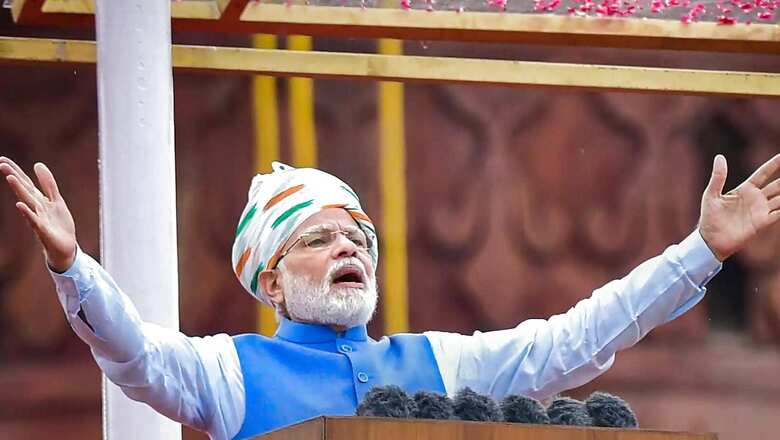
views
A seminal speech, to mark a seminal occasion. Prime Minister Narendra Modi’s address on the 76th anniversary of India’s Independence pressed all the right buttons. Tapping into the emotional wellsprings of nationalism and collective aspiration, he sought to summon up a can-do spirit to steer India through the ‘amrit kal’ of the next 25 years.
First, he invoked the primal power of ‘nari shakti’, affirming that the next 25 years will belong to women. Second, he avoided platitudes, and presented a SWOT analysis of India@75: what has been done, and what needs to be done. Third, he called for a participatory approach — ‘panch pran’ or a five-point pledge — to actualise his vision of ‘viksit Bharat’ (developed India).
The PM dwelt on public policy challenges and successes, chief among them the importance of changing societal behaviour. In his view, the ideal citizen takes pride in being Indian and celebrates his heritage, and to that end, embraces made-in-India products while rejecting foreign cultural domination in any shape or form. She battles against misogyny, corruption and nepotism, and looks down on these evils as social solecisms.
Interestingly, the fifth ‘pledge’, after a commitment to development, freedom, cultural heritage and unity in diversity, is to fulfil one’s responsibilities as a citizen. In the past, the PM has deployed the concept of collective consciousness as a citizen engagement and public policy tool, for example during the 2016 ‘Give it Up’ campaign. In today’s speech, he cited the Covid vaccination programme as a manifestation of this spirit.
While the content of the PM’s speech was not overtly political, it was clearly aimed at a global audience, and carried an assurance of India’s continuing commitment to democracy, pluralism and liberal values, especially in the face of recent criticisms with regard to religious and media freedoms.
The accent on India’s untapped woman power can be read both as a counter to the shocking rollback of women’s rights in the US earlier this year, and as an acknowledgement of a powerful emerging constituency that the BJP has successfully tapped.
The PM affirmed his vision of India 2047, as a fully developed and self-reliant economy that would meet the aspirations of the majority, while following an environment-friendly model. In this context, he signalled that India would keep its climate commitments and called on citizens to conserve water and power, and to promote organic or natural farming.
In highlighting swadeshi as a path to swaraj and suraj (independent and good governance), he reflected the growing concern over escalation of imports in general and the electronics import bill in particular. He pointed out that while the PLI scheme had led to a boom in electronics manufacturing, much remained to be done and the government was seeking to bridge the gap by bringing semiconductor fab to India.
Charmingly, he linked Aatmanirbhar Bharat and Make in India with the boom in the indigenous toy industry. “I salute the children… the five-year-olds who demand toys that are made in India,” he said. (India’s toy imports have fallen by 80 per cent in the last three years, while exports have gone up 60 per cent.)
Referring to his government’s signature Digital India campaign, he said it would play a crucial role in realising India’s ‘amrit kal’. It has and will continue to transform the quality of life with special regard to healthcare, education and effective delivery of public services. He pointed out that it had become something of a grassroots movement, with digital entrepreneurs and startups mushrooming not only in tier 2 and 3 towns, but in rural India.
Judiciously, he made it a point to acknowledge the contribution of Adivasi leaders like Birsa Munda in his roll call of freedom fighters. This can be seen as a tribute to President Droupadi Murmu, with an eye to the all-important tribal electorate in Gujarat and other states which will go to polls in the next 18 months.
His denunciation of ‘parivarvad’ and ‘bhrashtachar’ (corruption) as the biggest challenge that India would face in the coming 25 years was bound to raise hackles. The former can be interpreted as nepotism, or as dynastic politics. Congress president Sonia Gandhi naturally chose to read it as a broadside against the ‘Nehru-Gandhi legacy’, and issued an angry response.
All in all, PM Modi skillfully presented a vivid picture of a dynamic nation emerging from a long period of somnolence to take a great leap forward into true freedom for all — from economic hardships, discrimination, outdated social mores and the colonial mindset. On India’s 76th anniversary, the trifecta of nationalism, aspiration and hope is very much alive.
Bhavdeep Kang is a freelance writer and author of ‘Gurus: Stories of India’s Leading Babas’ and ‘Just Transferred: The Untold Story of Ashok Khemka’. A journalist since 1986, she has written extensively on national politics. Views expressed are personal.
Read the Latest News and Breaking News here




















Comments
0 comment